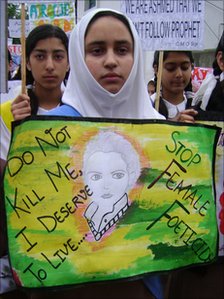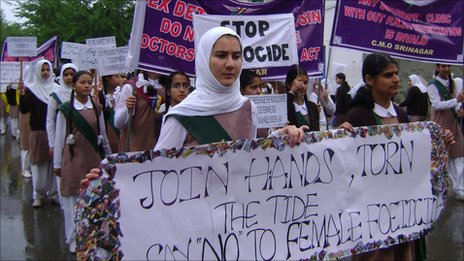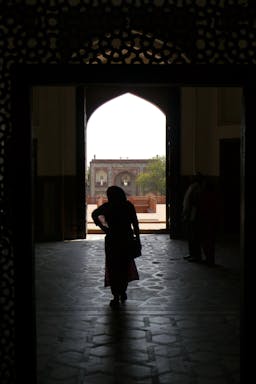Killed Before Birth!!!
Jan 21, 2015
Story


While more and more Kashmiri women are receiving education and entering the labour force, gender gaps stubbornly persist, particularly with regards to birth rates.
The 2011 census shows that Kashmir now accounts for higher rates of female mortality after birth, as the numbers of girls and women die prematurely has increased. There is a decline of sex-ratio in the state, where girls now account for 859 of 1,000 boys in the 0-6 age group, down by 82 points from 10 years ago. India’s gender imbalance has also shown a steep decline, with the lowest figure since independence in 1947, where the national child sex ratio is 914 females to 1,000 males.
The majority of the population in Kashmir follows Islam, which condemns infanticide. It is believed that female infanticide was common in pre-Islamic Arabia, however, by the time of holy messenger Prophet Muhammad (SAW) and the revelation of the Qur'an, female infanticide was strictly forbidden, and regarded as adult murder.
Many sociologists in the valley are of the view that gender inequality has its roots in the patriarchal system which is still prevalent in the state. They also argue that the misuse of modern technology had pushed more and more people to follow the illegal practices of female foeticide.
Medical technology contributes greatly in this practice, which has increased rampant in private hospitals and clinics. More than 100 ultrasound clinics have been sealed in the valley and strong action has been taken against various centres in different districts that submit incomplete forms, which are mandatory to be filled by pregnant women visiting the clinic. Any clinic which is not registered and has not submitted the mandatory form has been shut down and others are in the process of being raided.
Women’s rights activists and doctors say that the disproportionate mortality of girls generally begins during infancy, when they are killed even before they acquire the age of feasibility in mother’s womb. The discrimination factor is greatly responsible, as married women face pressure to produce male children. While girls are seen as a financial burden, requiring significant dowries, men are viewed as breadwinners, who will support their parents into old age. In a rapidly modernizing society, increasingly families choose to have fewer children, and some believe they are better off having no children then a girl.
In addition, the lack of consequences for those illegal running abortion clinics is also a contributing factor. The increased incidence of rape in the region has also contributed to the increase in the usage of these clinics, where some can see the sex of their fetus, and can then elect to abort if they are going to have a girl.
Sources at the Health Department say that the state government has failed to implement the Jammu & Kashmir Preconception and Prenatal Sex Selection (Prohibition and Regulation) Act, which came into effect in Kashmir only in 2006, and allows for ultra-sonography to identify the sex of the fetus. Clinics have recognized that they can earn more money by offering sex-selection tests. As per the law it is illegal to get the sex-selection done. The government has failed to execute this law in true letter and spirit.
The Health Department has taken some steps in ending this practice; an awareness campaign has been implemented, and a number of unauthorised pre-natal sex determination clinics have been shut down. This was initiated after the Census Department reported the decline in sex ratio.
However, it is still disturbing so see that having a girl child is considered a burden. Gender inequality of all types must be addressed for this practice to stop. And society must realise that gender equality is not just a women’s issue - a sense of responsibility, moral values, and religious education must be inculcated in our sons and daughters, where all can respect the opposite sex to create a safe and dignified environment for both men and women, girls and boys.
Everyone, including the government, educators, community groups and civil society organizations must be involved in ending discrimination and claiming rights. But we, as individuals, must come forward and be the agents of change, by welcoming and celebrating the birth of both our daughters and sons.
This article is part of a writing assignment for Voices of Our Future a program of World Pulse that provides rigorous new media and citizen journalism training for grassroots women leaders. World Pulse lifts and unites the voices of women from some of the most unheard regions of the world.




